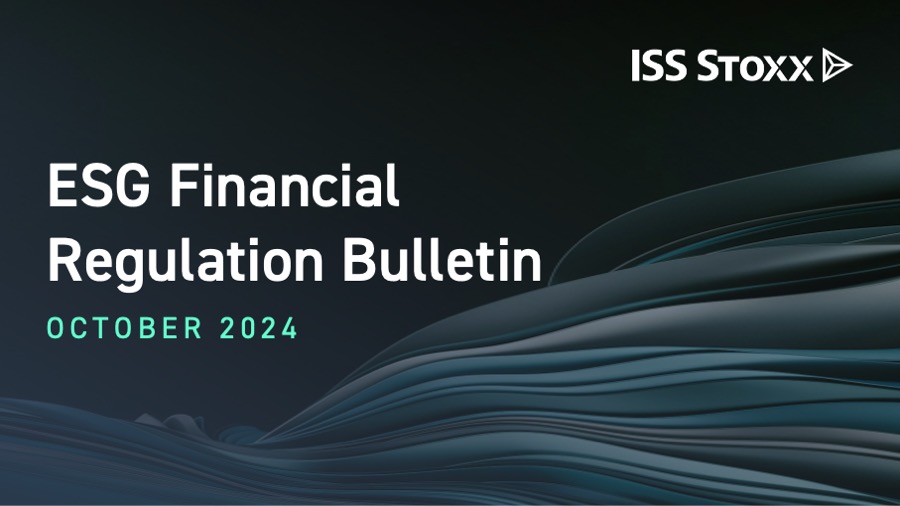International
TNFD
Taskforce on Nature-related Financial Disclosures Announces Backing for Cross-Reference Tables in Corporate Reporting
The Taskforce on Nature-related Financial Disclosures (TNFD) signaled its support, on September 16, for the use of cross-reference tables in corporate sustainability reporting. The TNFD made the announcement as part of its efforts to reduce compliance costs for corporate issuers and avoid duplicative reporting on sustainability-related information. The TNFD has closely consulted with international reporting bodies such as the International Sustainable Standards Board (ISSB), the Global Reporting Initiative (GRI), and the European Financial Reporting Advisory Group (EFRAG) to produce correspondence mappings across different reporting frameworks. The TNFD’s announcement includes an illustrative example of a cross-reference table between the TNFD reporting recommendations and the EU’s European Sustainable Reporting Standards (ESRS) disclosures.
GRI
Global Reporting Initiative Agrees to New Collaboration Initiatives with the International Foundation for Valuing Impacts
The Global Reporting Initiative (GRI) and the International Foundation for Valuing Impacts (IFVI) signed a memorandum of understanding on September 5 that committed the two organizations to increased collaboration. The IVFI was initially created “to build on the critical work of organizations like GRI” by monetarily quantifying sustainability impacts. In the memorandum, the two organizations commit to joint stakeholder engagement, fundraising, and marketing efforts; moreover, the organizations also agreed to collaborate on future methodologies, standards, and initiatives.
SBTi
Science Based Targets Initiative Announces Updated Scope of Corporate Net-Zero Standards Review
The Science Based Targets initiative (SBTi) published on September 18 the updated terms of reference for its ongoing review of the flagship SBTi Corporate Net-Zero Standard. In the terms of reference, the SBTi announced that it will update its approach to neutralization and short-term emission counterbalancing initiatives in the new net-zero standards. The SBTi is hosting two new workshops to gather information on carbon dioxide removal and storage, which will inform its neutralization approach in the finalized Corporate Net-Zero Standard.
SBTi Publishes Framework for Financial Institutions and Building Companies to Decarbonize Building Value Chain
The SBTi published on August 28 a new “decarbonization framework” setting 1.5°C-aligned emissions reduction targets for relevant sectors involved in the construction of new buildings. The framework covers all materials production, energy consumption, and fugitive emissions. As part of the framework, building companies and financial institutions “must commit to no new fossil fuel installations and halve [their] emissions by 2030.” Industry participants must make public commitments to stop installing fossil fuel-based hot water, heating, cooking, and power-generating equipment in new buildings; to reduce emissions related to their building’s energy use; to set reduction targets for embodied emissions (emissions related to raw materials, manufacturing, transportation, and construction); and to retrofit and decarbonize older buildings with new energy-efficient equipment.
APAC
Japan
Japan Government Publishes New Asset Owner Principles
The Japanese government published the “Asset Owner Principles” on August 28 as part of its “Policy Plan for Promoting Japan as a Leading Asset Management Center.” The Policy Plan aims to increase investment, corporate value, and household financial assets in Japan. The “Asset Owner Principles” cover best practices for Japanese asset owners’ investment practices, governance, and risk management.
The “Asset Owner Principles” consist of five primary tenets: asset owners should set investment targets and policies in the best interest of their beneficiaries; asset owners should secure expert internal and external knowledge for their investment decisions; asset owners should appropriately manage risks and potential conflicts of interest to ensure their investment methods are in the best interests of beneficiaries; asset owners should engage with stakeholders and disclose information on asset management “visualization”; and asset owners should conduct “stewardship activities by themselves or through the investment trustee” for the benefit of their beneficiaries. The Japanese Government adopted a comply-or-explain structure for the voluntary, principles-based document to account for the diverse scales, capacities, and structures of different asset owners.
Japanese Financial Services Agency Publishes Strategic Priorities for Coming Year
The Japanese Financial Services Agency (JFSA) published on September 13 a summary of its “Strategic Priorities July 2024-June 2025.” The summary covers JFSA’s primary initiatives to contribute to sustainable economic growth in Japan and to ensure the stability of the Japanese financial system. The “Strategic Priorities” include several governance-related provisions. As part of the “Policy Plan for Promoting Japan as a Leading Asset Management Center,” the JFSA has prioritized advancing corporate governance reforms in Japan; moreover, the JFSA has made it a strategic priority to improve its supervisory oversight of governance and risk-management practices across different sectors.
The JFSA also revealed several strategic initiatives to promote sustainable finance in Japan. The JFSA’s sustainable finance-related policies include improving the reliability of corporate sustainability reporting, facilitating the expansion of impact investing, promoting financial institutions’ investment in corporate decarbonization, and reviewing financial institutions’ efforts to address climate-related financial risks.
Singapore
Equities Market Review Group Sets Out Strategic Direction in Inaugural Meeting
The Equities Market Review Group held an inaugural meeting on August 19 to discuss its strategic direction. On August 27, group Chair Chee Hong Tat, minister for Transport, second minister for Finance, and deputy chairman of the Monetary Authority of Singapore (MAS), published conclusions from the meeting, which cover revitalizing Singapore’s capital markets by reviewing financial and regulatory policy; streamlining Singapore’s regulatory framework; improving the country’s listing process; and strengthening the corporate disclosure and governance of Singaporean issuers.
Singapore Exchange Regulation Integrates International Sustainable Reporting Standards into Its Climate Reporting Regime
The Singapore Exchange Regulation (SGX RegCo), a subsidiary of the Singapore Exchange (SGX) that undertakes all frontline regulatory functions on behalf of SGX and the regulated subsidiaries, announced on September 23 new climate-related reporting requirements for listed issuers. Since 2022, SGX RegCo has required climate reporting based on the Task Force on Climate-related Disclosures (TCFD). As part of the new requirements, beginning in FY2025, SGX-listed issuers will be required to report on their Scopes 1 and 2 GHG emissions; moreover, SGX RegCo will also require issuers to disclose on climate-related provisions of the IFRS Sustainability Disclosure Standards. In addition, SGX RegCo announced that it will begin a review to determine an implementation roadmap for Scope 3 GHG emissions disclosure. The SGX RegCo decided to conduct the review following a public consultation on the new reporting requirements, during which issuers expressed concerns over potential compliance costs for small issuers.
Hong Kong
Chair of Securities & Futures Commission Delivers Speech on Corporate Governance Reform in Singapore
Julia Leung, chief executive officer of Hong Kong’s Securities and Futures Commission (SFC), delivered a speech on September 20 about “Sound Corporate Governance as Bedrock for Quality Listing Market.” In her speech, Julia Leung outlined the need for corporate governance reform in Hong Kong to maintain the competitiveness of the country’s capital markets. The CEO signaled strong support for the Stock Exchange of Hong Kong’s proposed amendments to the Corporate Governance Code, while also identifying internal controls, director quality and independence, and board diversity as primary areas of focus for future regulatory initiatives.
Malaysia
SBTi Validates Bursa Malaysia’s Near- and Long-Term GHG Emission Targets
Bursa Malaysia became, on August 30, the “First exchange in Asia to have both near- and long-term GHG emissions reduction targets validated” by the SBTi. The exchange’s GHG targets, first pledged on September 22, 2021, include reducing absolute Scopes 1, 2, and 3 emissions by 50% by 2030 and by 90% by 2050.
Advisory Committee on Sustainable Reporting Publishes National Sustainability Reporting Framework
The Advisory Committee on Sustainability Reporting (ACSR) announced on September 24 the National Sustainability Reporting Framework (NSRF) to align Malaysian issuers’ sustainability reporting with the IFRS Sustainability Disclosure Standards. Following extensive public consultations, the ACSR developed the framework to address investors’ need for “consistent, comparable and reliable” sustainability disclosures. The new reporting requirements will impact all listed issuers on Bursa Malaysia’s Main and Ace Markets, as well as non-listed issuers with over RM2 billion in annual revenue; the adoption timeline for the new reporting requirements is proportionate to the size of the issuers, with large-listed issuers having to provide IFRS-aligned sustainability disclosure in 2025. Bursa Malaysia has opened a public consultation to align its Listing Requirements with the NSRF.
Indonesia
Otoritas Jasa Keuangan Announces Initiatives to Encourage Sustainable Finance
The Otoritas Jasa Keuangan (OJK), the Indonesian Securities Markets Authority, announced on August 28 its continued efforts to encourage sustainable finance. Sophia Wattimena, chairperson of the OJK Audit Board, discussed the regulator’s previous net zero initiatives, such as the release of the Indonesian Green Taxonomy and the regulation of carbon trading in Indonesia. The OJK also announced plans to update Indonesian sustainable disclosures to align with the International Financial Reporting Standards (IFRS) S1 and S2 standards.
Korea
Korea’s Financial Services Commission and Japan’s Financial Services Agency Announce Strengthened Collaboration
The chairman of the Financial Services Commission (FSC) and the commissioner of Japan’s Financial Services Agency (JFSA) met in Tokyo on September 3 to discuss the need for regional coordination and communication to address common issues. The two regulators specifically discussed their parallel initiatives to promote sustainable growth in their capital markets through governance reform. The FSC and JFSA discussed the development of Korea’s Corporate Value-up Program and Japan’s “Policy Plan for Promoting Japan as a Leading Asset Management Center.”
Australia
Australian Accounting Standards Board Vote to Approve Sustainability Reporting Standards
The Australian Accounting Standards Board (AASB) held a meeting on September 20 in which it formally voted to approve the Australian Sustainability Reporting Standards (AASB) S1 and S2. The AASB S1, which is a voluntary standard, covers “General Requirements for Disclosure of Sustainability-related Financial Information.” ASBS 1 includes most of the required disclosures in ISSB’s IFRS S1, as well as several Australia-specific paragraphs and provisions; however, AASB S1 modifies or deletes certain types of transition relief granted by the IFRS standard.
Meanwhile, AASB S2 is a mandatory standard covering “Climate-related Disclosures.” ASBS S2 sets disclosure requirements relating to short-, medium-, and long-term climate risks and opportunities; climate governance and risk management; climate strategy, metrics, and target; scenario analysis; and Scopes 1, 2, and 3 GHG emissions. Moreover, ASBS S2 incorporates into its Appendix D “selected content from [ASBS S1] that the AASB considers necessary to make [it] function as the standalone Standard for all climate-related financial disclosures.” ASBS S2 does not include any non-climate sustainability reporting requirements from ASBS S1. Corporate issuers and asset owners are subject to the climate-related financial disclosures under Australia’s new reporting framework.
Australian Auditing and Assurance Standards Board Publishes Exposure Draft on Australian Sustainability Assurance Standards
The Australian Auditing and Assurance Standards Board (AUASB) released on September 17 its exposure draft on a “Proposed Australian Standard on Sustainability Assurance ASSA 5010 Timeline for Audits and Reviews of Information in Sustainability Reports under the Corporations Act 2001.” The proposed standards were drafted in response to the Australian Treasury Laws Amendment (Financial Market Infrastructure and Other Measures) Bill 2024 which phases in mandatory climate-related reporting requirements (for more information on the Treasury Bill, See May Newsletter). The Treasury Bill granted the AUASB the authority to mandate the extent to which sustainability reports must be audited and/or assured and the timeframe of those audit and/or review requirements. The exposure draft proposes an assurance phasing model designed to be proportionate and considerate of current market conditions. The AUASB is consulting on the proposal until November 16 and will host a series of Roundtables to invite stakeholder feedback on the Exposure Draft.
New Zealand
Financial Markets Authority Publishes Review of Ethical Investing Funds
The New Zealand Financial Markets Authority (FMA) published on September 11 the results of a study on funds making ethical investment claims. Funds making ethical investment claims must disclose information under Part 2 of the Financial Markets Conduct Act of 2013. The FMA’s review did not find any fund that made ethical claims without any intention to implement a relevant investment strategy; however, the FMA did find “examples of confusing, unclear and inconsistent disclosure that may have made it difficult for investors to understand the product or whether ethical claims were being adhered to.” Following the study, the FMA encouraged issuers offering ethical investment products to make clear, concise, and effective disclosure on how they are incorporating ethical factors into their financial products. Moreover, the FMA announced that it will begin a “longer-term project” to engage with financial market participants and draft new guidance on relevant ethical disclosures.
Europe
EU
Draghi Report on European Competitiveness Critiques Burdensome EU Sustainable Reporting and Due Diligence Requirements
Mario Draghi, the former president of the European Central Bank and prime minister of Italy, released on September 9 his report, commissioned by the European Commission President Ursula von der Leyen, about how to increase the European Union’s competitiveness. In the report, Draghi covers challenges faced by key economic sectors in Europe, as well as “horizontal policies” designed to strengthen the European single market on a global scale. With respect to the sustainable investment landscape, Draghi writes that “the EU’s sustainability reporting and due diligence framework is a major source of regulatory burden, magnified by a lack of guidance to facilitate the application of complex rules and to clarify the interaction between various pieces of legislation.” Draghi specifically calls out the CSRD, CSDDD, SFDR, and the EU Taxonomy as sources of regulatory burden, while pointing to contradictions across different sustainable finance regulatory initiatives. The recommendations are in line with President von der Leyen’s “Clean Industrial Deal” priority for her second mandate.
European Financial Reporting Advisory Group Publishes Draft Comment Letter on the International Accounting Standards Board Exposure Draft
The European Financial Reporting Advisory Group (EFRAG) issued a comment letter on September 20 about the International Accounting Standards Board’s (IASB’s) Exposure Draft accounting standard on “Climate-related and Other Uncertainties in the Financial Statements – Proposed illustrative examples.” The Exposure Draft, released in July 2024, offers eight illustrative examples on how companies can report on climate-related and other uncertainties in their financial statements. In its comment letter, the EFRAG praises the IASB Exposure Draft; the EFRAG also asks the IASB to continue releasing illustrative examples and requests that the IASB develop a “Sustainability Reporting Conceptual Framework” showing the connectivity of information disclosed within and outside of annual financial reports.
EFRAG Publishes XBRL Taxonomy for the European Sustainable Reporting Standards Set 1
The EFRAG released on August 30 its digital taxonomy to enable tagging of issuers’ European Sustainable Reporting Standards (ESRS) Set 1 statements. The European Commission charged EFRAG with creating the XBRL taxonomy as the “correct digital transposition for the human-readable ESRS Set 1.” The XBRL digital taxonomy, and accompanying explanatory documents, will be used by the European Securities Markets Authority (ESMA) as it develops Regulatory Technical Standards for tagging ESRS statements.
UK
Financial Conduct Authority Offers Temporary Flexibility for Sustainability Naming and Marketing Rules
The UK Financial Conduct Authority (FCA) offered, on September 9, new limited temporary measures for firms coming into compliance with the ‘naming and marketing’ rules for sustainability-related financial products under the Sustainability Disclosure Requirements (SDR) regime. The FCA has now offered firms looking to comply with the “naming and marketing” rules for sustainability products an extension until April 2, 2025. The FCA’s announcement comes after its engagement with the industry regarding how firms are complying with the new regime, finding that it has taken longer than expected for firms to make appropriate changes and come into compliance with the higher product and disclosure standard. The FCA is clear that firms need to apply only in “exceptional circumstances” to take advantage of the forbearance and should utilize the flexibility only if needed. All firms must continue to comply with the FCA anti-greenwashing rule, which took effect 31 May 2024 (for more information, see May Newsletter). The FCA recently consulted on extending the regime to UK portfolio managers, which may now also be impacted by this extension.



